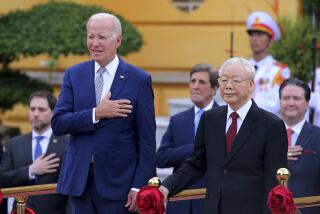‘Intense’ MIA Talks Held in Hanoi : But U.S. Gets No Commitment on Visit by Gen. Vessey
- Share via
BANGKOK, Thailand — An American negotiating team returned from Hanoi on Thursday with optimism but no Vietnamese commitment to raise the level of talks on American servicemen still missing from the Vietnam War.
The delegation, headed by National Security Council official Richard K. Childress, went to the Vietnamese capital Tuesday and met with a counterpart Hanoi team Tuesday and Wednesday. Childress told American reporters in Hanoi on Wednesday that the discussions had been “intense” and that “we have, I think. . , made progress.” He made no comment after returning here.
1,800 Unaccounted For
The Childress mission was the first face-to-face American-Vietnamese meeting since last fall on the controversial issue of nearly 1,800 U.S. servicemen unaccounted for in Vietnam since the Vietnamese conflict.
President Reagan has called on Hanoi to give “the fullest possible accounting” of the missing Americans and appointed retired Gen. John W. Vessey Jr., former chairman of the Joint Chiefs of Staff, to carry on the talks.
This week’s mission was designed to pave the way for a meeting between Vessey and Vietnamese officials. At the conclusion of the meetings in Hanoi, however, neither side said a visit by Vessey had been arranged.
The difficulty reportedly lies in the scope of the proposed talks. Dinh Nho Liem, a deputy foreign minister, said in Hanoi that the Vietnamese want any high-level talks to be “open-ended” and said his government will give “an early answer” on the proposed Vessey trip.
While Liem said in Hanoi that “our side will raise questions relating to relations between our two countries,” Childress and American officials here said the U.S. delegation discussed only a humanitarian agenda, including the fate of the missing Americans.
While both sides have said they consider the MIA issue humanitarian, the Americans insist that its solution will have no direct bearing on the possibility of normal diplomatic relations with Hanoi, which have been blocked by the Vietnamese occupation of Cambodia.
Vietnam’s struggling economy has suffered from the country’s diplomatic isolation, and the Vietnamese apparently are seeking at least an American commitment that an agreement on how to resolve the MIA issue will eventually eliminate it as a diplomatic obstacle.
Whether Vessey would have the power to make such a commitment, or whether the Reagan Administration seeks such a solution, is unclear.
And while both sides move tentatively toward resuming MIA talks and raising them to a higher level than before, the issue remains politically emotional in the United States.
$1 Million Reward Offered
Last month, a group of congressmen, including California Republicans Robert K. Dornan of Garden Grove, David Dreier of La Verne and Duncan L. Hunter of Coronado, offered $1 million in cash to any Vietnamese, Laotian or Cambodian who can produce a missing American serviceman alive. More than 2,400 American servicemen are listed as missing in the three Communist-ruled Indochinese countries.
Childress was joined in the Hanoi talks by Ann Mills Griffiths, head of the League of Families, an MIA support group, and Shepard Lowman, a State Department Indochina expert.
More to Read
Sign up for Essential California
The most important California stories and recommendations in your inbox every morning.
You may occasionally receive promotional content from the Los Angeles Times.









